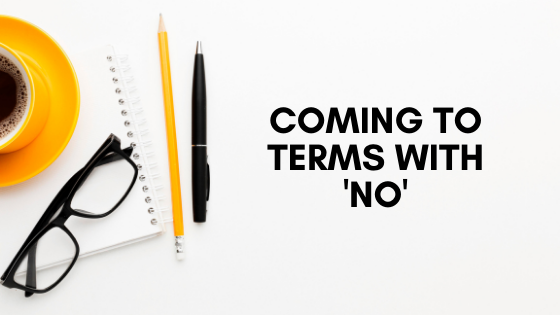Coming to terms with 'NO'

I’ve always struggled with ‘no’.
‘No’ is not a word people like or want to hear.
Traditionally we learn that it’s not a thing ‘nice’ people say (and we want to be nice, don’t we?).
We are taught from a young age, directly or indirectly, that ‘no’ is negative. It means being rejected. It means we failed.
In the past few years, and especially in the past few months, I have been working on my perception of the word ‘no’. I believe it doesn’t have to be negative. Here is what I’ve found so far.
Hearing ‘no’
I recently finished the book Never Split The Difference, by Chris Voss and Tahl Raz. It’s a book about negotiation mostly but it’s also so much more. Because negotiation involves dealing with other humans and humans tend to be complex beings, the book also touches on aspects of psychology. One of the main things that Chris Voss says is that hearing ‘no’ is NOT failure or rejection (necessarily). He adds that in the context of negotiation - which by the way includes dealing with colleagues, family, friends, a partner, parenting, etc. - a lot of the time ‘no’ simply means “Wait” or “I’m not comfortable with that.”
According to him 'no’ can mean:
-
“I’m not ready to agree.“
-
“You make me feel uncomfortable.”
-
“I don’t understand.”
-
“I don’t think I can afford it.”
-
“I want something else.”
-
“I need more information.”
-
“I want to talk it over with someone else.”
As you can see, in a lot of these scenarios it is question of internal tension or discomfort for the person who says ‘no’. It’s got nothing to do with the “You’re not good enough, I hate you, go away” kind of inner talk that might get triggered in our head when we hear the word.
Voss carries on saying that ‘no’ is not the end but the beginning of the negotiation and that you want to hear it as early as possible. One of the reasons for that is that ‘no’ makes people feel safe, secure, in control whereas pushing people to say ‘yes’ makes them defensive (we’ve all experience a pushy salesperson who made us feel like we wanted to run away at least once in our life!).
See, may hear ‘no’ from time to time and we might not like it, but there’s really nothing to worry about and our job is to understand what the real issue is by asking questions like “What about this doesn’t work for you?” or by using what Voss calls ‘labels’ and say something like: “It seems like there’s something here that bothers you” to unearth what the tension or discomfort might really be about.
So that’s about hearing ‘no’ from someone else. What about saying ‘no’ ourselves?
Saying ‘no’
Something else I read in another book recently (this one is a bit personal so I’ll keep it to myself for now if that’s okay) is that “it’s not your job to make sure others don’t experience disappointment.”
I found this sentence so powerful when I read it! Here it is again:
“it’s not your job to make sure others don’t experience disappointment.”
Saying ‘no’, despite a lot of the things we might have heard or unconsciously internalised, is not being mean, it’s not being unkind, and it’s not being selfish.
Saying ‘no’ is a way to express what we don’t want or what we cannot do.
It’s an expression of our individuality and our desires.
It simply means that we have standards and boundaries - which, if you want my opinion, should be encouraged.
So…
From learning to take a punch here and there when we hear the word ‘no’, to trying to find out what the real reason behind the initial ‘no’ is, to learning to say it myself as a way to assert myself and set boundaries, it seems that ‘no’ really isn’t that bad a word actually.
